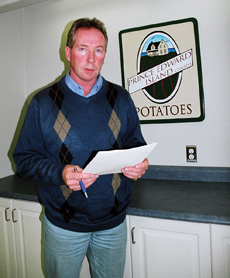
Features
Production
Research
Eye on Potatoes: P.E.I. Potato Board elects new executive
The (PEIPB) has a new executive for the 2007 season
March 19, 2008 By Eye On Potatoes
The Prince Edward Island Potato
Board (PEIPB) has a new executive for the 2007 season, with Kevin
MacIsaac of Bear River elected as chairman. MacIsaac, who operates Lily
Pond Farms – which produces processing, seed and tablestock potatoes –
with his brother, Blair, was first elected to the board in 2005 to
represent the processing potato sector for the Montague-Souris
district.
 |
| Kevin MacIsaac |
The Prince Edward Island Potato Board (PEIPB) has a new executive for the 2007 season, with Kevin MacIsaac of Bear River elected as chairman. MacIsaac, who operates Lily Pond Farms – which produces processing, seed and tablestock potatoes – with his brother, Blair, was first elected to the board in 2005 to represent the processing potato sector for the Montague-Souris district. He has also been active with other groups, including the Potato Producers’ Association, the P.E.I. Soil & Crop Improvement Association and the Souris River Watershed Group. MacIsaac has also been the board’s representative on the P.E.I. ADAPT Council for the past two years. Peter VanNieuwenhuyzen was elected as vice-chairman of the board. He was elected to represent the tablestock potato sector for the Charlottetown district in 2006, and he has experience in serving on potato and agricultural organizations. VanNiewenhuyzen and his family operate Vanco Farms Ltd.
Wade Caseley, of Margate, was elected as the secretary/treasurer. Caseley is a second-year director and represents the processing potato sector for the Summerside district. He has previously served on the potato processing committee, which negotiates processing contracts on behalf of the processing growers in P.E.I. The executive is rounded out by West Prince district directors Barry Gallant (seed), Peter Griffin (tablestock) and Harris Callaghan (processing); Summerside district directors Morley Wood (tablestock) and Donald Stavert (seed); Charlottetown district directors Wayne Diamond (seed) and Ricky Sanderson (processing), and Montague-Souris district director Brian Ching (tablestock). The seed director position in Montague-Souris is currently vacant.
The Kolar district may have the second highest rate of liquor consumption within the Karnataka area of India but a recent trend in agricultural practices shows residents aren’t drinking it. According to recent reports from Indian media, potato producers in the district are spraying bootleg liquor on their crop in a bid to control Angamari disease, a fungus which appears as black spots on the potato plant’s leaves. Sales of illicit liquor have doubled in the district this season as farmers apply the liquid, which is also 20 times cheaper a litre than fungicide sprays, to their potato crops. The Kolar district is home to about 9,000 hectares of potatoes and the crop is considered one of the main sources of income for farmers in the area. Several years ago, farmers in another nearby area of India claimed that spraying Coca Cola and Pepsi on their crops helped protect them from pests, a claim backed by at least one member of the Indian Institute of Horticulture Research.
Delicious and versatile, Alturas potatoes are also highly popular with knowledgeable growers. This tuber rates as the fifth most commonly planted potato in Idaho – the state that produces more potatoes than any other. Alturas is suitable for processing, not only into frozen potato products – or dehydrated foods such as instant potato flakes – but also for fresh-pack sale in supermarkets, according to Richard G. Novy, based in Aberdeen, Idaho, about 200 miles southeast of Boise. Novy is a co-developer of the top-ranked tuber, along with Joseph J. Pavek, Dennis L. Corsini, Charles R. Brown, plus university co-investigators in Washington state, Idaho, and Oregon. After more than a decade of evaluations – including taste tests, trials in research fields, and experiments at potato-processing plants – the scientists decided to offer Alturas potato to growers in 2002. Their decision came after the tuber had, for example, met the exacting standards of taste-test panelists and had, in the outdoor trials, yielded more potatoes than the classic Russet Burbank – the “American Idol” of the potato world, against which all promising experimental potatoes are compared. Alturas has a light netting or russeting, which distinguishes russets from other potato types, on its light-tan skin, with white flesh inside. Researchers named Alturas for a prehistoric lake that once covered much of south-central Idaho. ¶
Print this page